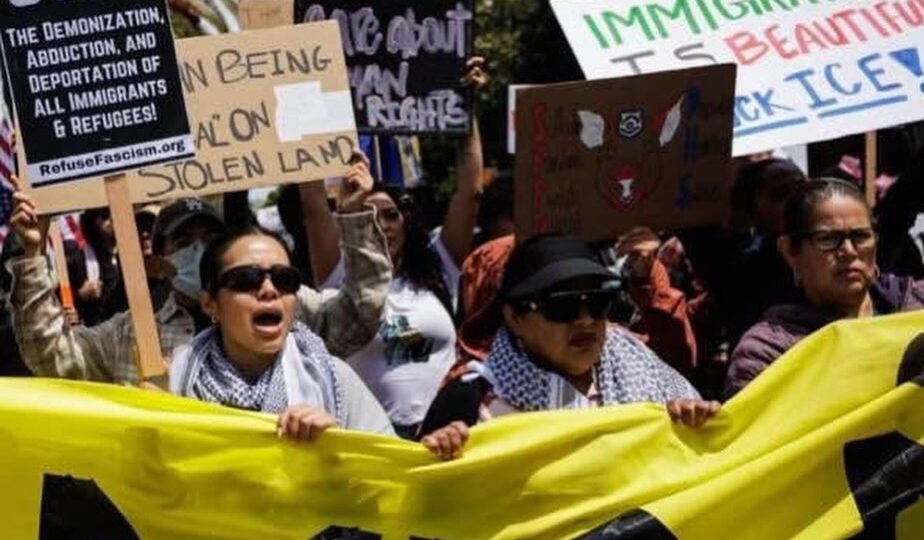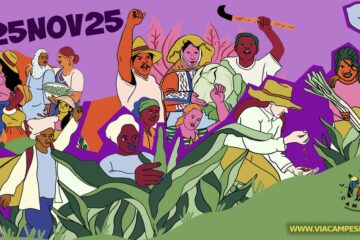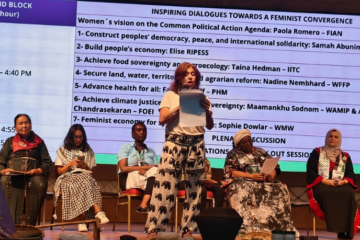The Trump administration’s domestic policy in the United States has been one of terror, hatred, and persecution against migrant communities from various regions. In just over six months in office, countless cases of violence, rights violations, forced deportations, threats to life, and the intensive rise of militarization have flooded the news. The U.S. Immigration and Customs Enforcement (ICE), with strong encouragement and resources from the government, has detained undocumented migrants and sent innocent people to detention centers that resemble concentration camps.
Protests against this regressive policy have erupted across the country, such as a three-day march from Northern California to the state capital, Sacramento, where activists demanded immigration reform. The action was part of a broader mobilization of popular movements against violent police raids that have become routine in migrant communities. The text below, written by Yaquelin López, a migrant activist living in the U.S., offers an overview of this context.

Today, we find ourselves in a moment of extreme concern and, at the same time, deep historical responsibility. Seven months have passed since Donald Trump reassumed the presidency of the United States. What many voices strongly warned about — and others tried to minimize — has become a harsh and painful reality: the country is now under a regime that has declared war on our migrant communities. This government has repurposed the state apparatus to promote fear as policy, militarization as a daily tool, and institutional violence as the norm.
We state it clearly: a systematic persecution is being orchestrated against women, undocumented people, working families, and LGBTQ+ communities — many of whom fled structural violence in their countries of origin and now face new forms of oppression in a country that once promised freedom.
In recent months, state violence has taken the form of crueler, broader, and more relentless laws. Fast-track deportation programs have been reactivated, even in communities that have been in the country for decades. Civil spaces have been militarized: hospitals, schools, and bus stations have been turned into sites of surveillance and arrest. Media attacks have intensified, portraying us as a threat, a burden, an internal enemy.
Policies That Criminalize Life
The state of Florida, in particular, has been one of the first and most aggressive laboratories of this exclusion machine. The approval and widespread enforcement of laws like SB 1718 not only criminalize those who migrate, but also those who offer support, legal support, or simply refuse to remain idle in the face of injustice. Today, in Florida, giving a ride to an undocumented woman can be considered a crime. A doctor might turn away an undocumented patient. A child might go to school afraid their mother won’t be there when they come home.
All this unfolds amid silence, institutional indifference, the erosion of civil rights, and the hardening of public discourse.
A politics of terror is becoming normalized. Fear is being sown as a strategy of governance. They want us to stop speaking, organizing, and dreaming.
But in the midst of this grim context, we — migrant women, mothers, workers, activists, and community leaders — have not given up. We refuse to remain silent or retreat, because fear cannot be stronger than our digny. Organizing continues to be — as it always has — our main defense, our collective shield, our trench of hope.
We not only resist; we build. We weave support networks when the state targets us. We care for each other when the law seeks to punish us. We educate, we heal, we nourish, we fight. Above all, we continue to dream of a world where migration is not a crime, where life does not depend on legal status, and where life, freedom, and justice know no borders.
Today’s migrations — especially those of women and people with diverse identities — are rarely free or voluntary decisions. In most cases, people are forced to leave their countries due to difficult and interconnected circumstances such as extreme poverty, gender-based violence, resource extraction, climate change, food insecurity, and the presence of organized crime. These causes reveal that migration is not a simple journey, but a consequence of deep inequalities that push many to seek a better life away from home.
From a feminist perspective, we recognize that migration is feminized — not only because there are more migrant women than in previous decades, but also because the conditions they face are marked by heightened exposure to abuse, precariousness, and lack of protection. These are women migrating alone with their children, women who have survived trafficking, women fleeing gender violence that is not recognized as grounds for asylum, domestic and care workers, undocumented agricultural workers, women who sustain economies without rights or protection.
Migration does not begin at the border; it begins with the violence of extractivism, dispossession, and free trade agreements. The complicity of the United States in upholding economic models that impoverish our countries is part of the migration cycle.
Under the Trump administration, this process has worsened through the use of the state apparatus as a tool of persecution and control. Migration has become a political battleground where racist, misogynist, and anti-immigrant rhetoric consolidates — not only criminalizing the movement of people but denying their humanity and right to a dignified life.
The Trump government represents the institutionalization of hatred: it has revived the politics of fear, using migration as a scapegoat to justify social spending cuts, repression, and control.
Survival itself has been criminalized. Crossing a border out of hunger is treated more harshly than committing a multimillion-dollar corporate fraud.We are living through a critical moment in the recent history of human rights in the United States. Under the current administration, the systematic erosion of the legal and ethical framework that protects migrants has intensified, especially impacting women, trans people, lesbians, gay men, and other gender-nonconforming identities.
Migrant women face multiple barriers to exercising fundamental rights: the right to health is violated by policies that deny access to basic services to undocumented people; the right to live free from violence is obstructed when survivors of domestic or sexual violence are afraid to report it for fear of deportation; the right to dignified working conditions is nonexistent for many undocumented women, who are exposed to exploitation, with no opportunity for union organizing or legal protection.
For LGBTQ+ migrants, the situation is even more alarming. Many flee their countries due to persecution based on sexual orientation or gender identity. Yet upon arrival in the United States, they encounter a system that neither recognizes nor guarantees their specific rights. Trans people are placed in detention centers where their gender identity is not respected, where they are subjected to institutional violence and sexual abuse. Asylum claims based on sexual orientation are denied or rejected due to cultural and religious bias.
Official discourse has erased all sensitivity toward these populations. The criminalization of migrants intersects with hatred toward sexual dissidence, resulting in a policy of symbolic — and often real — extermination that must be urgently denounced and confronted.
Even as they try to divide, silence, and destroy us, we continue to stand for life, for community, and for justice. In every act of solidarity, in every network we weave, in every voice we raise, we are clearly saying that we will not give up. And that above fear and repression, we will always choose the path of love, dignity, and shared hope. Love is stronger than hate.
Yaquelin López lives in the United States and is part of the organization Women Working Together. This text is an edited version of her presentation at the virtual forum “Migration Crisis: Feminist Perspectives from the Americas. How Does Migration Impact Women’s Bodies and Lives?”, held on May 24, 2025.




